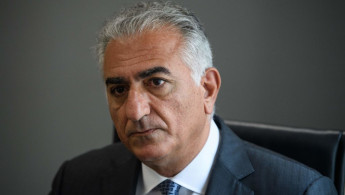Son of Iran's last shah will visit Israel amid ongoing violence against Palestinians
The exiled son of Iran's last shah who was toppled in the 1979 revolution is set to visit Israel this week to "deliver a message of friendship," despite the ongoing deadly attacks on Palestinians.
Reza Pahlavi, who is based in the US, announced on Sunday that he will meet senior Israeli government figures to discuss how the "ancient bond" between Iran and Israel "can be rekindled for the benefit of both nations".
The exiled figure, who has become increasingly vocal in his criticism of the Iranian government in recent months, will be the "most prominent Iranian to visit Israel in history”, according to a statement on his Twitter account.
Relations between the two countries have been hostile since the 1979 revolution overthrew Shah Mohamed Reza Pahlavi - Reza Pahlavi's father and an ally of Israel.
Israeli Prime Minister Benjamin Netanyahu has repeatedly warned of possible strikes on Iran over its nuclear programme.
While Iran's government has since September 2021 launched a violent crackdown on protesters opposed to strict hijab laws, Israel has intensified its deadly raids on Palestinian towns and cities, with at least 100 people killed so far this year.
Israel is currently led by a far-right government, with several ministers having used violent racist rhetoric against Palestinians in the past.
I am traveling to Israel to deliver a message of friendship from the Iranian people, engage Israeli water experts on ways to address the regime’s abuse of Iran’s natural resources and pay respects to the victims of the Holocaust on Yom HaShoah.
— Reza Pahlavi (@PahlaviReza) April 16, 2023
I want the people of Israel to… pic.twitter.com/wyzlqqm9A2
This does not appear to have affected Pahlavi's views on the Israeli government, as he announced the planned visit on Twitter.
"The Iranian and Jewish people have ancient bonds dating back to Cyrus the Great and Queen Esther," he said in a statement posted online.
"As the children of Cyrus, the Iranian people aspire to have a government that honors his legacy of upholding human rights and respecting religious and cultural diversity, including through the restoration of peaceful and friendly relations with Israel and Iran’s other neighbours in the region."
Pahlavi said he will discuss "mutually-beneficial economic, cultural and environmental opportunities" between the two nations, including the use of Israeli water technology to alleviate Iran’s water depletion crisis.
While Pahlavi has some supporters among the Iranian diaspora in the West, he appears to hold little sway inside Iran.
The deposed shah's son said he also plans to visit the Western Wall in Jerusalem, close to the Al-Aqsa Mosque, which is repeatedly stormed by Israeli extremists, backed by the military.
Earlier in April, while Muslims marked the holy month of Ramadan, Israeli security forces violently stormed the mosque, detaining and assaulting hundreds of Palestinian worshippers.
Pahlavi will also attend the official Holocaust Remembrance Day ceremony at Yad Vashem.
Following the announcement, Nader Hashemi, Director of the Denver Middle East Institute, said: "He claims he supports democracy in Iran. So he's going to Israel."
On social media, Hashemi shared a link to Amnesty International's report about the "crime of apartheid" committed by Israeli forces against Palestinians.
"The human rights community views Israel as an apartheid state. At the moment, Jewish democracy in Israel is being rapidly eroded by Bibi and company," he tweeted.
"What a time to go to Israel..."
Raising the issue of human rights!? Careful, as the Israeli government might accuse you of ‘terrorism’
— kristyan benedict (@KreaseChan) April 17, 2023
Ps re the right to water - some background reading:https://t.co/J1PP0Ccu9b https://t.co/TjRlEx9RGO
Pahlavi has been touring European capitals on a PR campaign, 44 years after his father was unseated.
He was speaking at Oxford University just one month ago talking about the possibility of a "peaceful transition" in Iran and the need for "maximum support" for the Iranian people.
Iranians have taken to the streets in their thousands since the death in police custody of Mahsa Amini, a 22-year-old Kurdish woman who died after allegedly being beaten by "morality police" in Tehran.
Many Iranians however are also sceptical about overseas opposition figures such as Pahlavi, especially considering their close relations with the United States and Israel.
Support for their efforts inside Iran remains low and many in the diaspora argue that their visibility plays into the hands of the regime, which blames foreign enemies for stoking the unrest.
Following the announcement, Israel’s Intelligence Minister Gila Gamliel said: "We're taking the first step toward rebuilding ties between our peoples."
"We're happy to host the Iranian crown prince and admire his courageous decision to visit Israel for the first time," her press statement said.





 Follow the Middle East's top stories in English at The New Arab on Google News
Follow the Middle East's top stories in English at The New Arab on Google News


